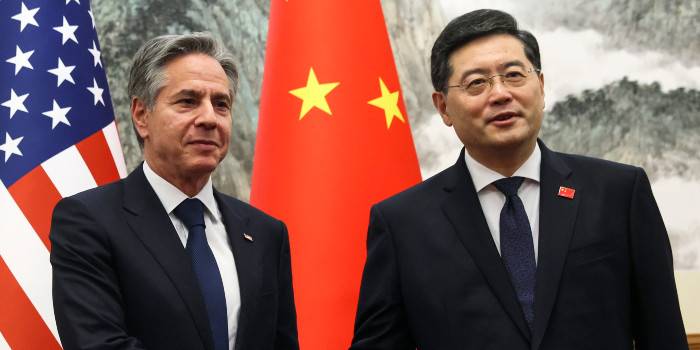(Headline USA) U.S. Secretary of State Antony Blinken kicked off two days of high-stakes diplomatic talks in Beijing aimed at trying to cool exploding tensions between America and China, in the first visit to China by such a high-ranking American official since Biden took office on Sunday.
Blinken opened his program by meeting Chinese Foreign Minister Qin Gang for an extended discussion to be followed by a working dinner. He’ll have additional talks with Qin, as well as China’s top diplomat Wang Yi and possibly President Xi Jinping, on Monday.
Neither Blinken nor Qin made any substantive comments to reporters as they began the meeting at the Diaoyutai State Guesthouse.
Prospects for any significant breakthroughs are slim. Animosity and recriminations have steadily escalated over a series of disagreements that have implications for global security and stability.
The controversy laden Blinken is the highest-level American official to visit China since Joe Biden took office and the first secretary of state to make the trip in five years.
Biden and Xi agreed to Blinken’s trip early at a meeting last year in Bali.
It came within a day of happening in February but was delayed by the diplomatic and political tumult brought on by the discovery of a Chinese spy balloon flying across America that was eventually shot down.
The list of disagreements and potential conflict points is long, ranging from trade with Taiwan, human rights conditions in China and Hong Kong to Chinese military assertiveness in the South China Sea and Russia’s war in Ukraine.
Shortly before leaving, Blinken emphasized the importance of America and China establishing and maintaining better lines of communication. The U.S. wants to make sure “that the competition we have with China doesn’t veer into conflict” due to avoidable misunderstandings, he told reporters.
Biden and Xi had made commitments to improve communications “precisely so that we can make sure we are communicating as clearly as possible to avoid possible misunderstandings and miscommunications,” Blinken said Friday.
Biden told White House reporters Saturday he was “hoping that over the next several months, I’ll be meeting with Xi again and talking about legitimate differences we have, but also how … to get along.”
Chances for such a meeting could come at a Group of 20 leaders’ gathering in September in New Delhi and at the Asia-Pacific Economic Cooperation summit in November in San Francisco that the United States is hosting.
The few meetings between America and China that have taken place have been punctuated by bursts of angry rhetoric from both sides over the Taiwan Strait, their broader intentions in the Indo-Pacific region, China’s refusal to condemn Russia for its war against Ukraine, and U.S. allegations from Washington that Beijing is attempting to boost its worldwide surveillance capabilities, including in Cuba.
Earlier this month, China’s defense minister rebuffed a request from U.S. Defense Secretary Lloyd Austin for a meeting on the sidelines of a security symposium in Singapore, a sign of continuing discontent.
Austin said Friday he was confident that he and his Chinese counterpart would meet “at some point in time, but we’re not there yet.”
Underscoring the difficulties, China rejected a report by a U.S. security firm, that blamed Chinese-linked hackers for attacks on hundreds of public agencies, schools and other targets around the world, as “far-fetched and unprofessional”
A Chinese foreign ministry spokesperson repeated accusations that Washington carries out hacking attacks and complained the cybersecurity industry rarely reports on them.
That followed a similar retort earlier in the week when China said Qin had in a phone call with Blinken urged the United States to respect “China’s core concerns” such as the issue of Taiwan’s self-rule, “stop interfering in China’s internal affairs, and stop harming China’s sovereignty, security and development interests in the name of competition.”
Meanwhile, the national security advisers of the United States, Japan and the Philippines held their first joint talks Friday and agreed to strengthen their defense cooperation, in part to counter China’s growing influence and ambitions.
This coincides with America inking an agreement with Australia and Britain to provide the first with nuclear-powered submarines, with China moving rapidly to expand its diplomatic presence, especially in the Indian Ocean and the Pacific island nations, where it has opened, or has plans to open, at least five new embassies over the next year.
The agreement is part of an 18-month-old nuclear partnership given the acronym AUKUS — for Australia, the United Kingdom and the United States.
China’s spokesperson for the Foreign Ministry, Hua Chunying, issued a statement of cautious optimism as Blinken started his first day of meetings in Beijing.
“Hope this meeting can help steer China-U.S. relations back to what the two Presidents agreed upon in Bali,” she said in a statement on Twitter.
Adapted from reporting by the Associated Press

